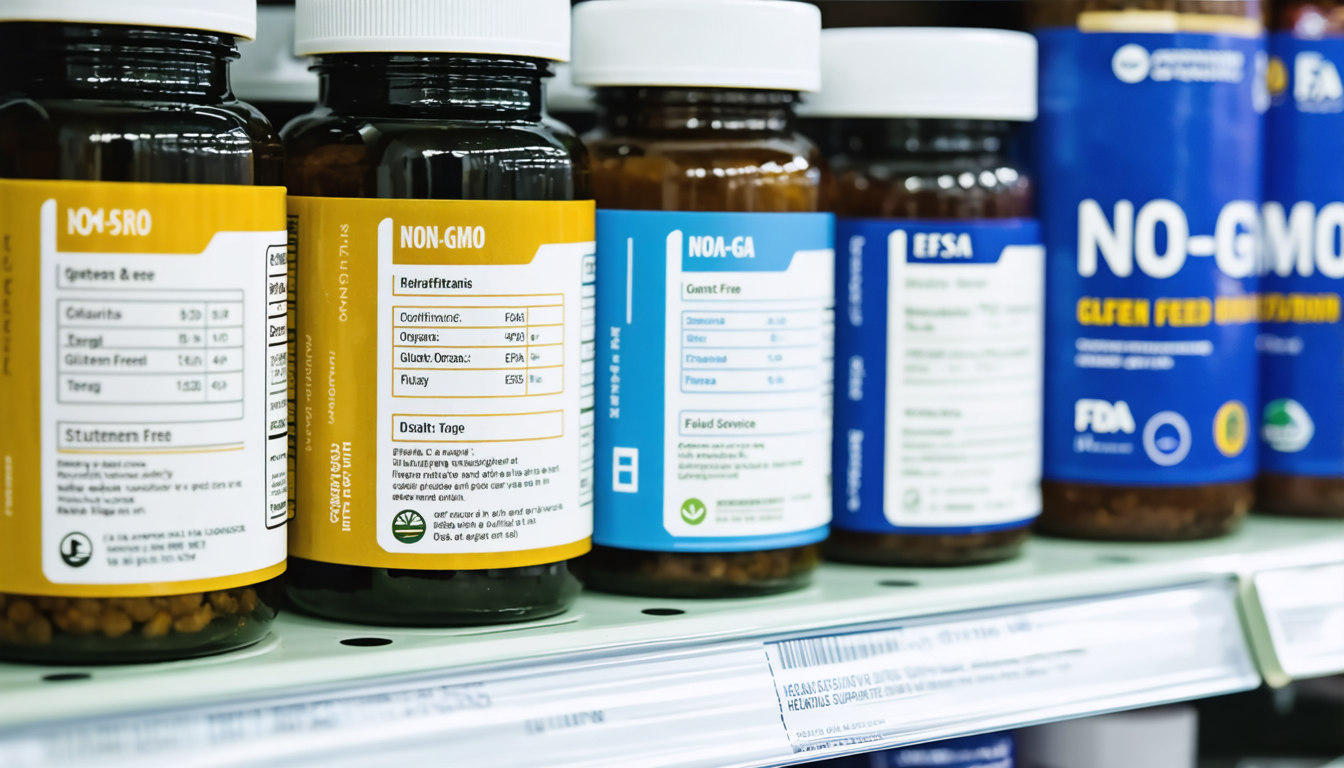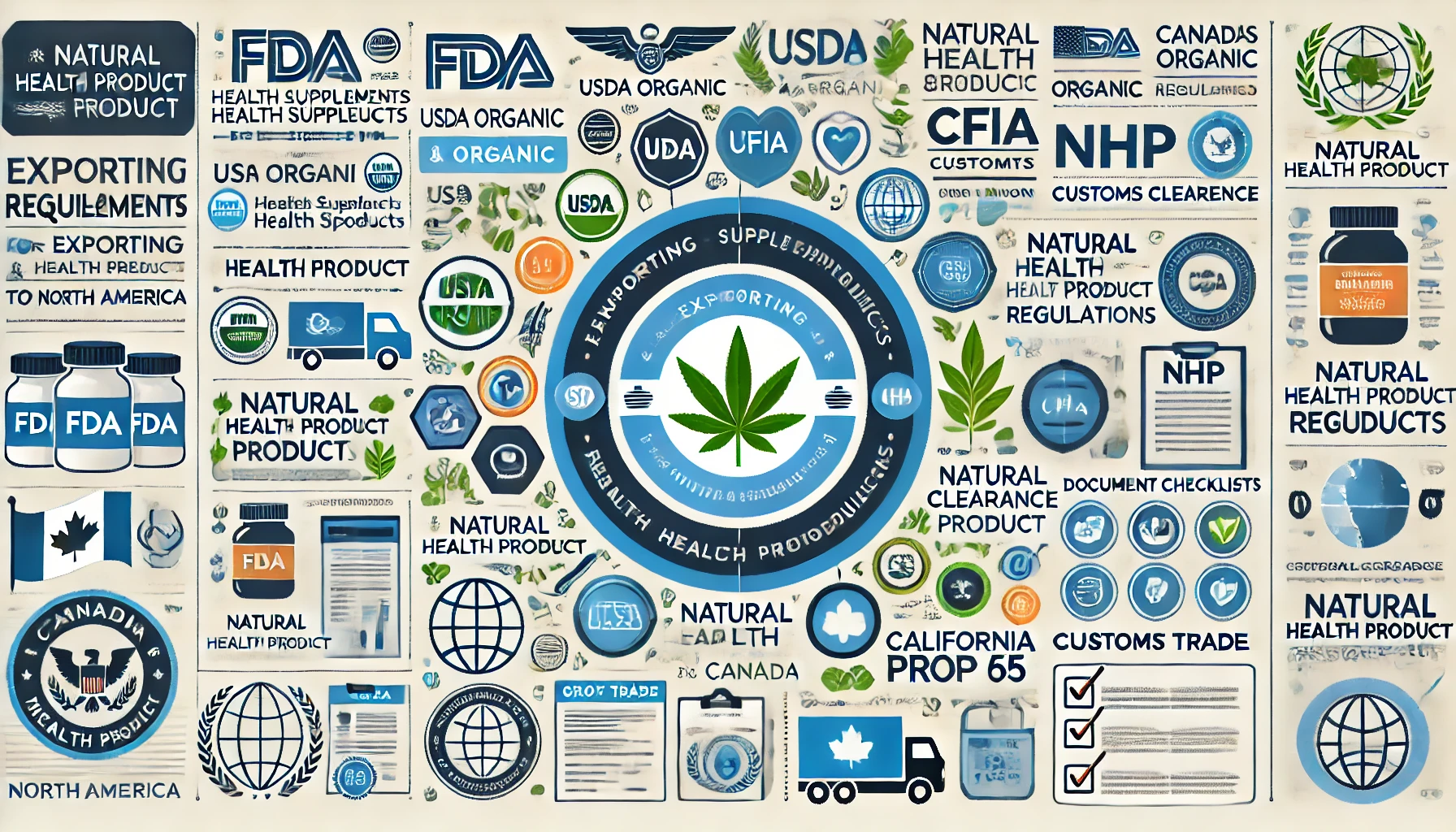When it comes to dietary supplements and functional foods, the regulatory frameworks in the U.S. (FDA) and the EU are significantly different. In this blog post, we'll explore these differences in terms of product definitions, health claims, ingredient approval, labeling requirements, and market surveillance. Understanding these distinctions is crucial for manufacturers, especially when selling products internationally.
The FDA (U.S.) and the EU have distinct approaches to regulating dietary supplements and functional foods. In the U.S., dietary supplements are products designed to supplement the diet, including vitamins, minerals, herbs, and amino acids, without the need for FDA approval. In contrast, the EU regulates these products more strictly, requiring health claims to be approved by the European Food Safety Authority (EFSA), and follows a more rigorous review process for ingredients and labels.
Now, let’s take a deeper look at the key differences between FDA (U.S.) and EU regulations, focusing on product definitions, health claims, ingredient approval, labeling requirements, and market surveillance.
Key Differences in FDA (U.S.) and EU Regulations for Dietary Supplements and Functional Foods
Product Definitions
FDA (U.S.):
In the U.S., dietary supplements are defined as products meant to complement the diet. This includes vitamins, minerals, herbs, amino acids, and other nutrients. While the FDA requires strict labeling and ingredient requirements, dietary supplements do not undergo pre-market approval.
EU:
In the EU, dietary supplements are referred to as "food supplements." The ingredients typically mirror those in the U.S., but functional foods (foods with health benefits) are heavily regulated with stringent health claim requirements. Functional foods must adhere to EU regulations to ensure their claims are substantiated scientifically.

Health Claims / Functional Claims
FDA (U.S.):
- Health Claims: The FDA allows health claims related to dietary supplements but only those supported by scientific evidence indicating a reduction in disease risk. These claims must undergo FDA approval.
- Structure/Function Claims: These claims, which are not related to disease treatment or prevention, do not require FDA approval, but must be reported to the FDA before being used on labels.
EU:
- Health Claims: In the EU, health claims must be approved by the European Food Safety Authority (EFSA). The claim must be substantiated with rigorous scientific evidence before it can appear on labels.
- Functional Claims: Functional foods must have health-related claims scientifically validated by EFSA.
Table: Health Claims - FDA vs EU
| Aspect | FDA (U.S.) | EU (European Union) |
|---|---|---|
| Health Claims | Approved by FDA if backed by scientific evidence | Approved by EFSA, subject to scientific review |
| Structure/Function Claims | No approval needed, but must be reported | Must be scientifically validated and approved by EFSA |
| Health Claim Approval Process | Time-consuming, complex process | Stringent and time-intensive process |
Ingredient Approval and Formula Standards
FDA (U.S.):
- Ingredient Approval: The FDA does not require pre-market approval for ingredients, but manufacturers must ensure that their products are safe. If new or controversial ingredients are introduced, manufacturers may need to provide safety data.
- Formula Standards: No mandatory formula standards exist, but supplements must comply with safety and hygiene standards.
EU:
- Ingredient Approval: Ingredients used in supplements must be on an approved list in the EU. Any new ingredient or one not listed in the authorized lists must undergo safety evaluations by EFSA.
- Formula Standards: The EU has detailed guidelines regarding ingredient composition, dosage, and labeling. Any formula deviating from approved standards risks being banned.
Table: Ingredient Approval - FDA vs EU
| Aspect | FDA (U.S.) | EU (European Union) |
|---|---|---|
| Ingredient Approval | Ingredients need to be safe, but no pre-market approval | Must be listed on EU’s approved ingredient list |
| Formula Standards | No strict formula standards, but must be safe | Detailed composition guidelines with strict regulations |

Labeling Requirements
FDA (U.S.):
The FDA mandates that dietary supplements must have clear labeling, including product name, net quantity, ingredients, allergen information, and manufacturer details. Any health-related claims must adhere to FDA's strict guidelines.
EU:
The EU has similar labeling requirements, but additionally, any health claim or functional statement on the product must be EFSA-approved before use. Labels must also include comprehensive nutritional information and warnings where necessary.
Table: Labeling Requirements - FDA vs EU
| Aspect | FDA (U.S.) | EU (European Union) |
|---|---|---|
| Health Claims on Label | Must comply with FDA guidelines for health claims | Must be EFSA approved before usage |
| Nutritional Information | Mandatory for all supplements | Mandatory, with additional specifics on certain nutrients |
Market Surveillance and Compliance
FDA (U.S.):
The FDA operates on a post-market surveillance basis. This means that dietary supplements are not subject to pre-market approval, but the FDA conducts random inspections and investigates products post-launch. If issues are found, such as contamination or misleading labeling, the FDA can intervene.
EU:
The EU’s regulatory framework is more proactive. Products must meet strict compliance before reaching the market. Regulatory agencies in EU member states conduct inspections and enforce product recalls if a product violates safety or labeling laws.
Table: Market Surveillance - FDA vs EU
| Aspect | FDA (U.S.) | EU (European Union) |
|---|---|---|
| Pre-market Approval | No pre-market approval, post-market surveillance | Pre-market approval required for health claims |
| Market Surveillance | Post-market, random checks and audits | Strict pre-market inspection and regulatory checks |

Additional Considerations for Overseas Factories
When selling health products like dietary supplements and functional foods in the U.S. and EU markets, overseas manufacturers need to adhere to strict local regulations. Here are key points to consider:
1. Regulatory Requirements for Overseas Factories
Each region’s regulatory body has different requirements for manufacturing facilities. In the U.S., the FDA mandates that factories follow Good Manufacturing Practices (GMP) and submit safety documentation if new ingredients are used. In the EU, factories must comply with European Food Safety Authority (EFSA) guidelines and submit products for approval before they can be sold in the market.
2. Product Quality Requirements
Both the FDA and EU have strict standards for product quality, especially concerning contaminants. For example, heavy metals, pesticide residues, and microbial contamination are closely monitored. Overseas manufacturers must ensure their products meet these safety thresholds:
- Heavy Metals: The U.S. FDA has set limits for contaminants like lead, arsenic, and cadmium in dietary supplements. In the EU, these limits are generally stricter, and products must be tested to ensure they comply with regulations on heavy metals.
- Pesticide Residues: Both the U.S. and EU set maximum residue limits for pesticides in food products. EU regulations tend to be more restrictive, requiring more extensive testing for pesticide residues in supplements and functional foods.
- Microbial Contamination: Supplements in both markets are subject to microbial testing to ensure they are free from harmful bacteria or fungi. The EU requires more detailed testing procedures than the U.S.
These factors are verified through independent third-party testing to ensure that the products comply with both FDA and EU standards.
3. Factory Certification Requirements
For overseas factories, particularly those in China or other non-EU countries, obtaining the necessary certifications is crucial. The FDA requires GMP certification, while the EU may require additional certifications such as ISO 22000 (for food safety) or GMP standards for dietary supplements. Factories must also pass regular audits to ensure continued compliance.
4. Handling Product Issues or Recalls
If a product fails to meet regulatory standards in either the U.S. or the EU, the approach to resolution differs:
- FDA (U.S.): Post-market surveillance means the FDA can intervene if a product is found to be unsafe or falsely labeled. Manufacturers must have a plan for dealing with potential product recalls.
- EU (European Union): The EU takes a more proactive approach with pre-market testing and stringent compliance checks. If a product violates regulations, it may face recalls or bans, depending on the severity of the issue.

Conclusion
Navigating the regulatory requirements for dietary supplements and functional foods in the U.S. and EU markets can be challenging, but understanding the key differences can help manufacturers avoid costly mistakes. By ensuring compliance with local laws on labeling, ingredient approval, product safety, and quality standards (such as limits on heavy metals, pesticide residues, and microbial contamination), manufacturers can successfully enter and maintain a presence in these lucrative markets.









